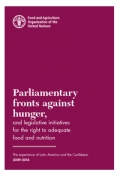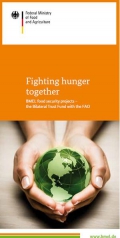文件

Private Sector
01 Mar 2017
2015年9月25日,联合国193个成员国通过了《2030年可持续发展议程》,包括17项可持续发展目标和169个具体目标,向国际社会承诺在2016至2030年间消除贫困和饥饿并实现可持续发展。六个月后,又确定了一个包含230个指标的可持续发展目标全球指标框架,以监测169个具体目标并跟踪进展,成为可持续发展目标问责结构的基础。在数量上为千年发展目标四倍的这些指标对各国来说是个巨大的挑战。粮农组织被指定为21个可持续发展目标指标的“托管人”联合国机构,同时作为另外六个指标的促进机构,能够帮助各国应对新的监测挑战。本出版物介绍了粮农组织在制定和加强衡量粮食、农业和可持续利用自然资源的指标方面所开展的工作,阐明了粮农组织托管的21个指标。它描述了本组织如何支持各国跟踪进展并在监测与决策之间建立联系,以实现可持续发展目标。

Parliamentary alliances
01 Jan 2017
This publication details the experience of the Parliamentary Fronts Against Hunger in Latin America and the Caribbean in promoting legislation aimed at achieving the right to adequate food. It presents some of the lessons learned on how the parliamentary fronts work and the mechanisms that have proved useful to them. There is...
Resource Partners
06 Dec 2016
Britain’s support to multilateral development agencies will build on work which in 2014 immunised 56 million children in some of the world’s poorest countries, helped 10.4 million young people living through humanitarian emergencies to access education and provided access to clean water for 27.8 million people.
Parliamentary alliances
01 Dec 2016
Achieving the food security, nutrition and sustainable agriculture goals by 2030 requires a coordinated set of actions on a number of fronts: coherent policies and programmes, an increase of investments in line with national priorities and greater collaboration across different sectors and stakeholders. This series of Policy Guidance Notes ensures that policy makers have the support they need to understand how sectoral issues affect food security and nutrition and to recognise how to incorporate these considerations into their policies.
Resource Partners
11 Nov 2016
Since 2002, the Federal Ministry of Agriculture (BMEL) supports projects of the Food and Agriculture Organization of the United Nations (FAO) to erradicate hunger and malnutrition through a Bilateral Trust Fund (BTF). The projects aim at supporting the subject of "food security" at strategic level both in the FAO and in the partner countries. They are planned together with the FAO and structured in accordance with Germany’s government development policy guidelines, based on its support framework. 
